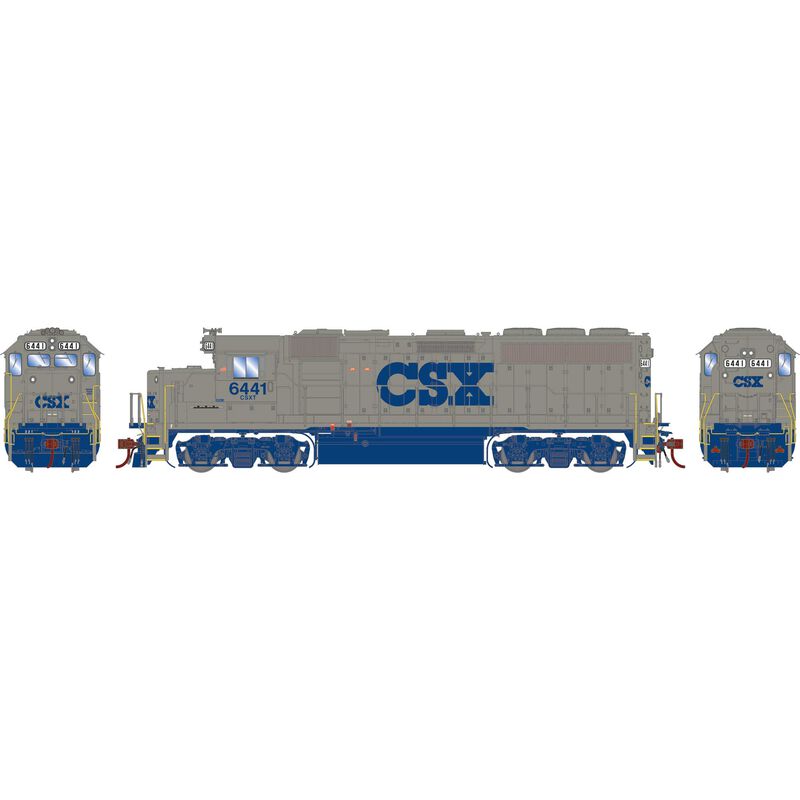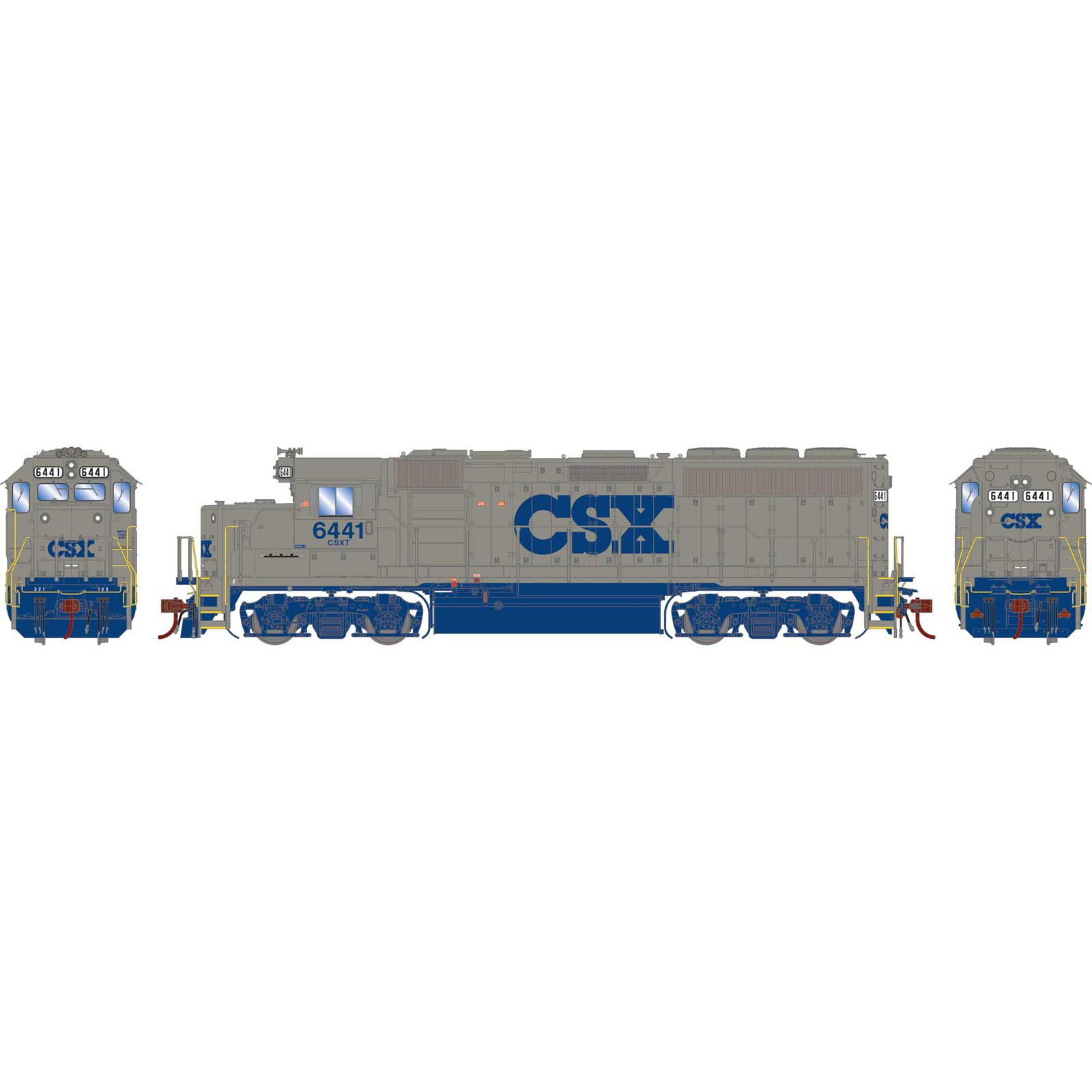CSX FEATURES:
- Newly tooled rear slug connection boxes
- Large front anticlimber
- Mid production with corrugated grilles
- Body-mounted side bell
- Chessie/CSX style front rock plow
- K5 horn
- Lit class lights and number boards (effect in DCC)
During the late 1980’s, CSX Transportation modified many of their GP40-2’s into “slug mothers” that powered RDMT (CSX term, short for Road-Mate) road slugs. The “slug” is a term used for (in most cases) a secondary locomotive that has a removed/deactivated engine but kept it’s traction motors. The “mother” unit at slow speeds can produce enough power to provide electric current to other traction motors using the same amount of fuel consumption. The ‘” mother” and “slug” combination can provide the power of two locomotives using a single diesel powered unit. CSX liked the results, and modified many older GP30 and GP35’s into road slugs, retaining their cab controls so that they could still be operated in lead position, but without the noise from the prime mover.
ROAD NUMBER SPECIFIC FEATURES:
#6427- “Stripe” repaint
- regular radiator fans
- “mail slot” battery box doors
- “Stealth” repaint
- regular radiator fans
- regular battery box doors
- “Stealth” repaint
- Q radiator fans
- “mail slot” battery box doors
- large exhaust silencer
- nose toilet hatch
GP40-2 LOCOMOTIVE FEATURES:
- Coupler cut levers
- Trainline and MU hoses
- Drop steps unless noted
- MU stands
- “Nub” style walkway tread
- Windshield wipers
- Lift rings
- Wire grab irons
- Walkway tread
- Sanding lines
- Lit number boards
- Lit class lights, if equipped
- Lit signal lights and/or beacons, if equipped
- Bell placement & type per prototype
- Detailed fuel tank with fuel fillers, fuel gauges, and breather pipes
- Blomberg-B or Blomberg-M trucks with appropriate bearing caps
- Speed recorder unless noted
- See-through cab windows and full cab interior
- Fine-scale Celcon handrails for scale appearance
- Etched metal fan grilles
- Air tanks mounted below sill unless noted
- Body-mounted McHenry® scale knuckle couplers - Kadee® compatible
- DCC-ready features Quick Plug™ plug-and-play technology with 21-pin NEM connector
- Scaled from prototype resources including drawings, field measurements, photographs, and more
- Accurately painted and printed paint schemes
- Genesis driveline with 5-pole skew wound motor, precision machined flywheels, and multi-link drivetrain
- All-wheel drive with precision gears for smooth & quiet operation
- All-wheel electrical pickup provides reliable current flow
- Wheels with RP25 contours operate on all popular brands of track
- LED Lighting for realistic appearance
- Heavy die-cast frame for greater traction and more pulling power
- Packaging securely holds for the model for safe storage
- Minimum radius: 18”
PRIMED FOR GRIME MODELS FEATURE
- Duplicated look and feel of “In Service” equipment
- Faded base colors matched to the prototype
- Perfect starting point for adding grime and rust
LEGENDARY LIVERIES
What are Legendary Liveries? An Athearn exclusive, they are the ultimate answer to “What if?” Featuring some of the most popular railroad paint schemes of all time, these models are perfect for collecting, proto-freelancing, or just plain fun! Whether company proposed paint schemes, canceled locomotive orders, or alternate takes on history, Legendary Liveries are fun and unique additions to any roster. Enjoy these items, and answer the ultimate railroad question of: “What if?”
SOUND-EQUIPPED MODELS ALSO FEATURE
- Onboard DCC decoder with SoundTraxx Tsunami2 sound
- Dual cube speakers for optimal sound quality
- Sound units operate in both DC and DCC
- Full DCC functions available when operated in DCC mode
- Engine, horn, and bell sounds work in DC
- All functions NMRA compatible in DCC mode
- Precision slow speed control
- Program a multiple unit (MU) lashup with lead unit only horn, bell, and lights
- Many functions can be altered via Configuration Value (CV) changes
- CV chart included in the box
PROTOTYPE SPECIFIC INFORMATION
By the early 1970s, many first generation diesels were reaching the end of their service lives. One of the most common replacement locomotives became the GP40-2. EMD began production of the 16-cylinder, turbocharged, 3000 horsepower engines in 1972. These locomotives were developed for service where higher horsepower and faster service were preferable. A major feature for the GP40-2 was the introduction of the “dash 2” modular electrical cabinet. For more than 40 years, the GP40-2 has worked main line freights, locals, switching jobs, yard service, and helper service. Many remain in service today.

